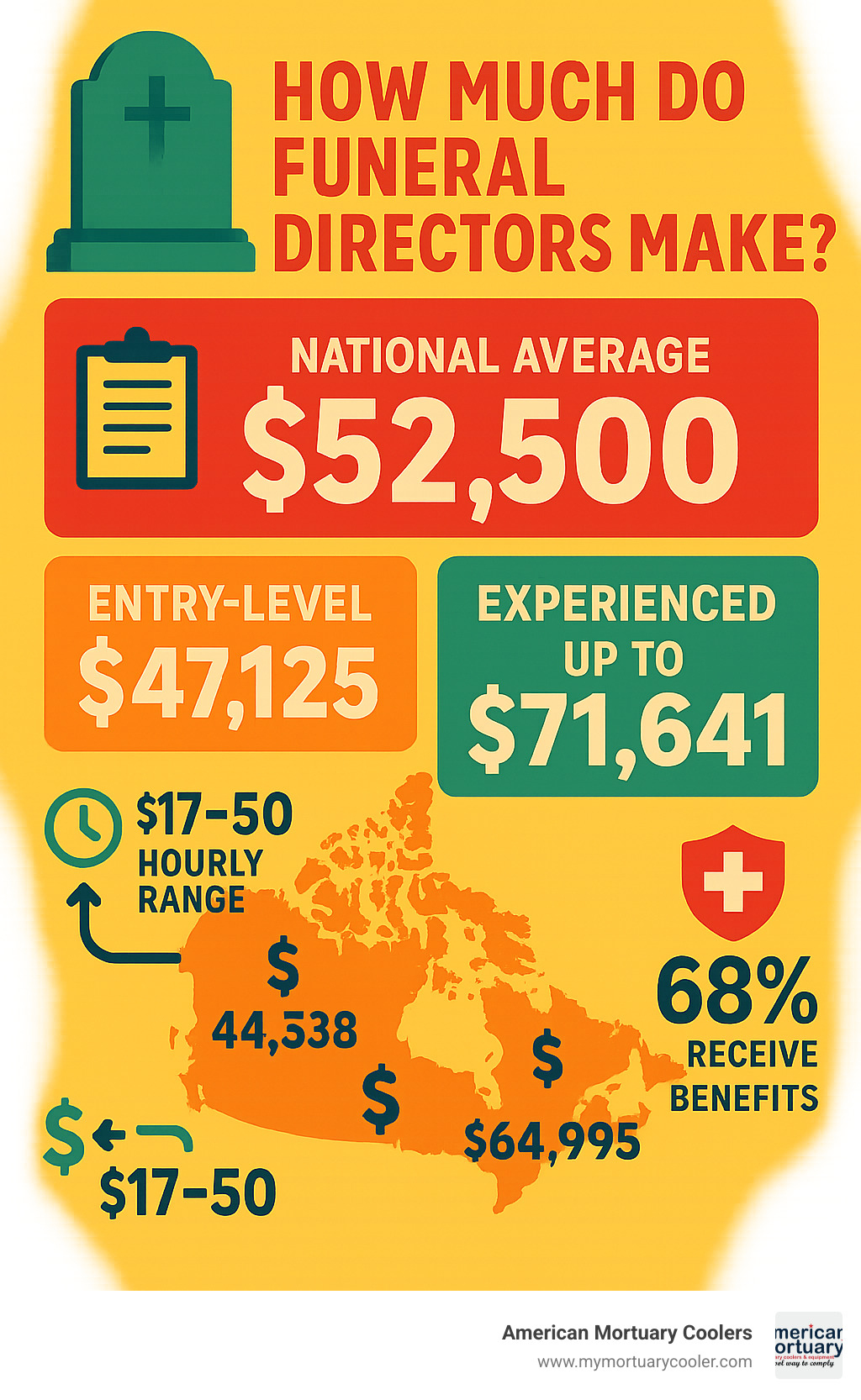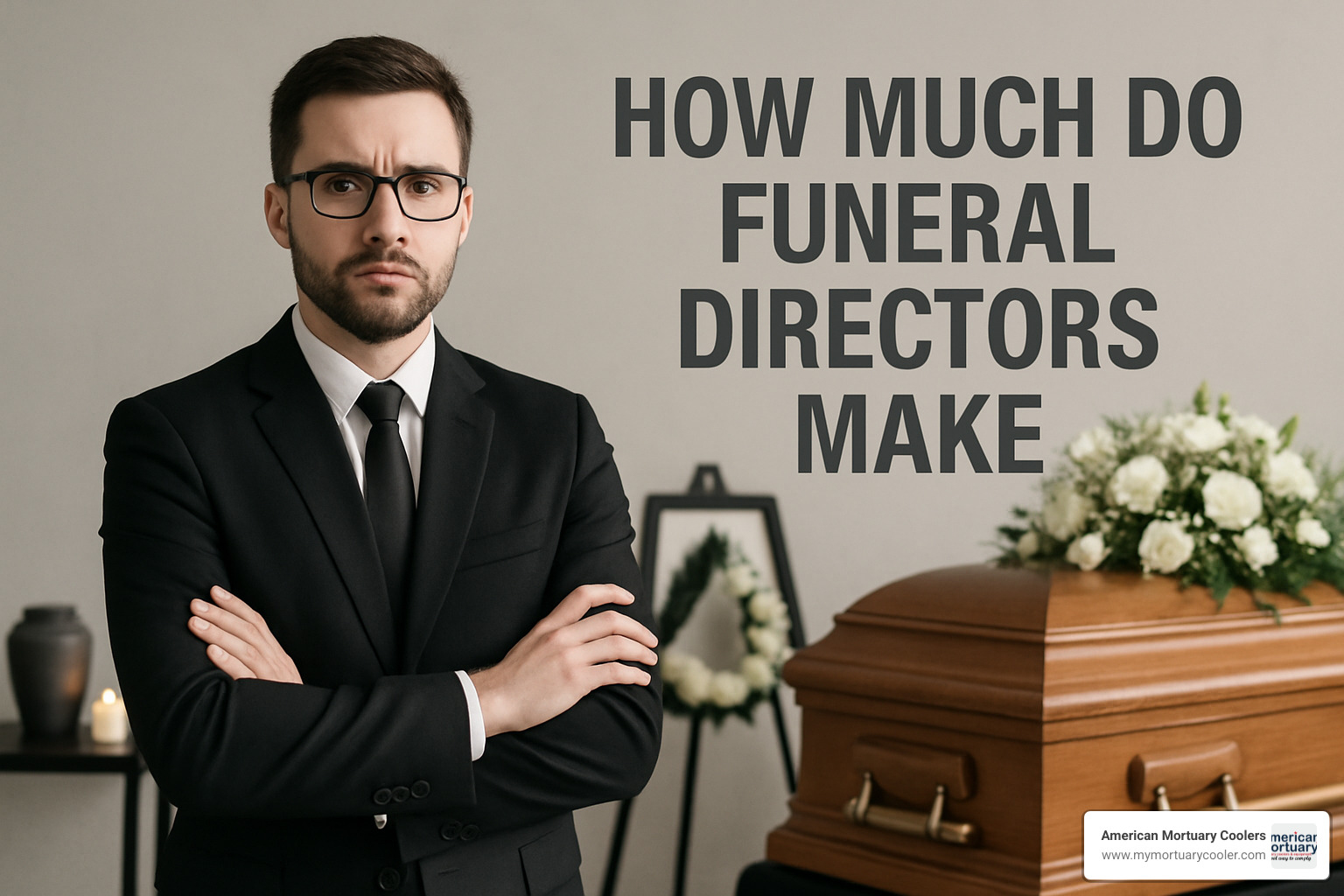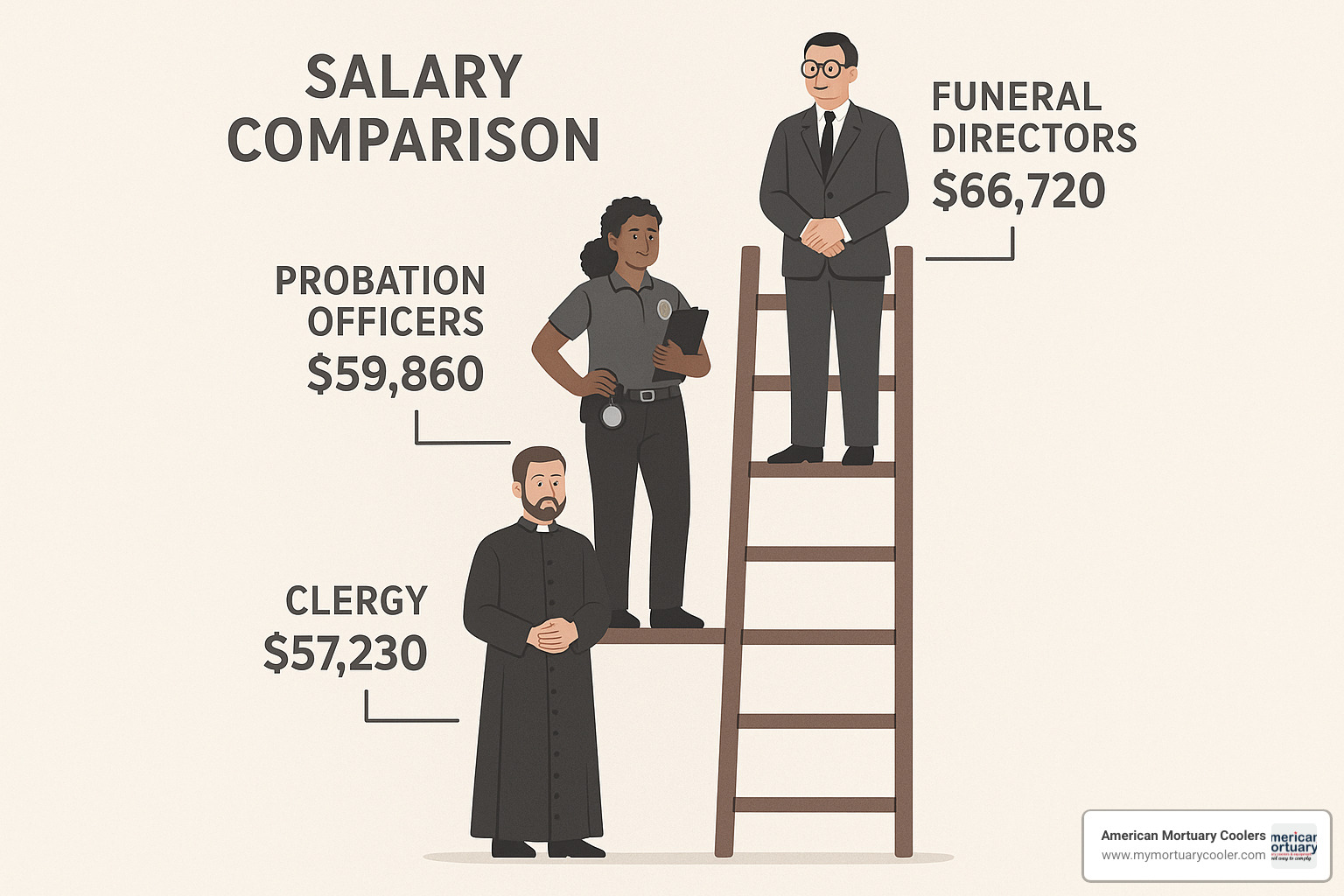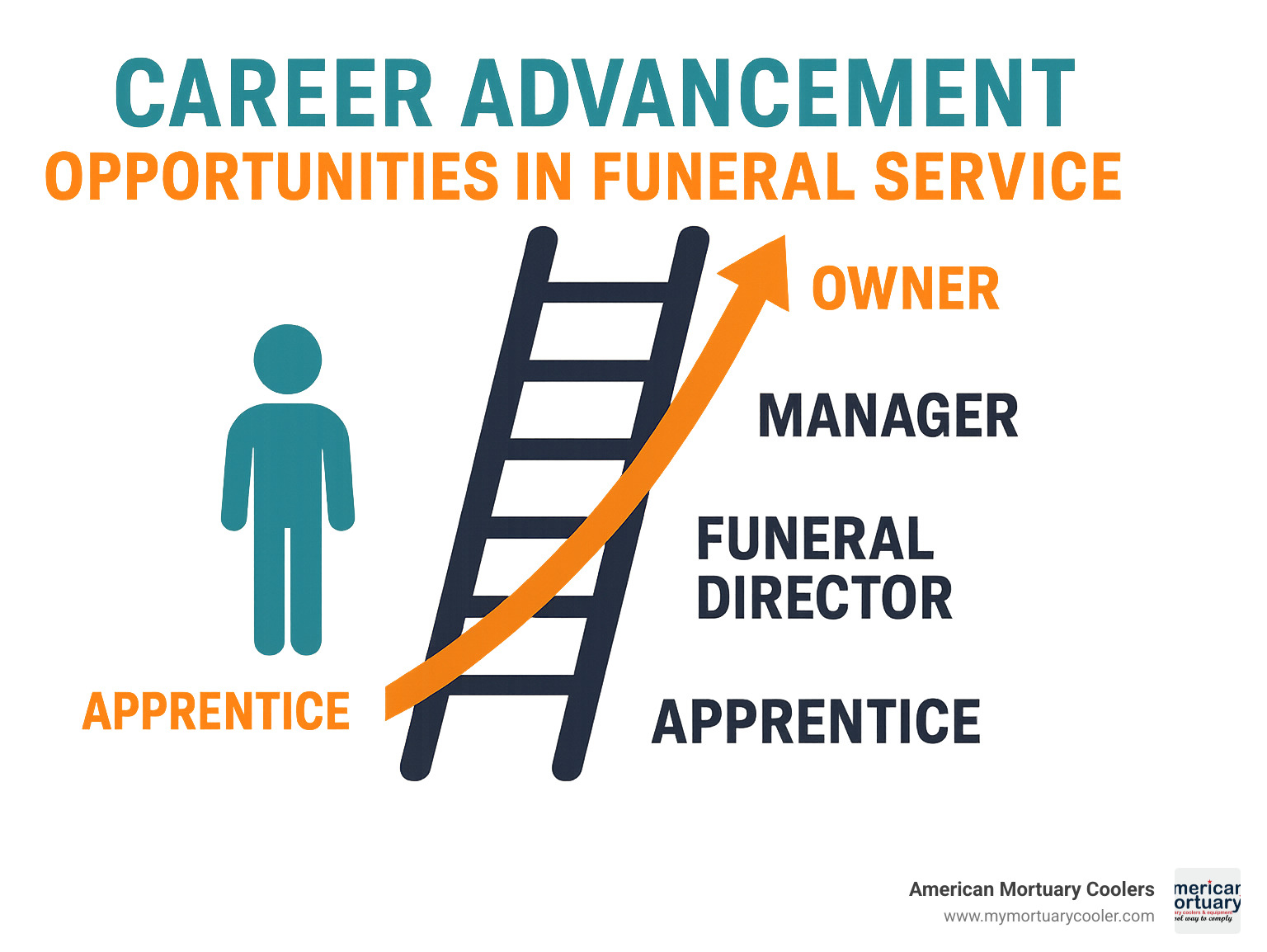
Everything You Need to Know About Funeral Director Salaries
Why Funeral Director Salaries Matter for Your Career Decision
How much do funeral directors make is one of the most common questions from people considering this meaningful career path. The answer varies significantly based on location, experience, and role responsibilities.
Quick Answer - Funeral Director Salaries in Canada:
- National Average: $52,500 per year ($26.92 per hour)
- Entry-Level: $47,125 annually
- Experienced: Up to $71,641 annually
- Provincial Range: $45,338 (Quebec) to $64,995 (British Columbia)
- Hourly Range: $17.00 to $50.00 across Canada
Over a 34-year career, one veteran funeral director shared: "I generally made considerably less than an elementary school teacher, who we all agree are paid too little." This highlights that funeral directing often pays modestly compared to other professions requiring similar education and responsibility levels.
The compensation picture includes overtime, on-call premiums, and sometimes pre-need sales commissions. Benefits like medical and dental coverage (available to 68% of directors) add value to the total package.
As American Mortuary Coolers with years of experience in the funeral service industry, we've helped countless funeral homes optimize their operations and understand the business side of death care. Our expertise comes from working directly with funeral home owners and directors across North America.

How Much Do Funeral Directors Make in Canada?

When people ask how much do funeral directors make in Canada, the answer depends largely on where you work. Across Canada, funeral directors typically earn between $47,125 and $71,641 annually.
British Columbia leads with funeral directors earning an average of $64,995 per year. Meanwhile, directors in Quebec earn considerably less at $45,338 annually - nearly a $20,000 difference for the same job.
Ontario follows close behind BC with salaries averaging $60,500, while Saskatchewan sits at the national average of $52,500. The national median hourly wage works out to $29.91, though individual rates span from $17.00 to $50.00 per hour.
| Province | Average Annual Salary | Median Hourly Wage | Hourly Range |
|---|---|---|---|
| British Columbia | $64,995 | $30.69 | $21.24 - $45.37 |
| Ontario | $60,500 | $31.25 | $17.20 - $51.28 |
| Alberta | $56,250 | $27.82 | $19.84 - $36.47 |
| Saskatchewan | $52,500 | $25.70 | $18.11 - $64.68 |
| New Brunswick | $48,823 | - | - |
| Quebec | $45,338 | - | - |
For more detailed information, you can explore historical wage data and more statistics through Canada's official data portal. Since many funeral directors also work as embalmers, check out The Ultimate Guide to Embalmer Salary: What You Need to Know for a complete picture.
Average salary: how much do funeral directors make nationally?
The national median of $52,500 represents the middle ground. Entry-level funeral directors typically start around $47,125, while experienced professionals can reach $71,641 or higher, especially in management roles.
Bonus opportunities exist but tend to be modest. Most funeral directors receive annual bonuses between $500 and $3,000. The spread between lowest and highest earners ranges from about $37,000 to $64,000 annually.
Provincial breakdown: how much do funeral directors make by region?
British Columbia's median of $30.69 per hour reflects the province's higher cost of living. Alberta presents a unique situation with its median of $27.82 per hour and a relatively tight range, suggesting more standardized pay scales.
Saskatchewan shows the most dramatic variation, with hourly wages ranging from $18.11 to $64.68. This wide spread likely reflects differences between small-town funeral homes and urban operations.
Factors That Influence Funeral Director Pay

When people ask how much do funeral directors make, several key factors create significant pay differences, even within the same city or province.
Experience makes the biggest difference in funeral director salaries. Early career directors with 1-4 years typically earn around $41,756 annually, while those with 5-9 years see their pay jump to approximately $49,990.
Education and licensing costs represent a significant upfront investment. Most provinces require a mortuary science diploma plus apprenticeship training, which can cost $15,000-$30,000 before you start earning a full salary.
The type of employer also shapes your paycheck. Corporate funeral home chains often offer standardized pay scales and solid benefits, while family-owned funeral homes might provide more flexible arrangements or profit-sharing opportunities.
Location matters tremendously. Urban funeral directors typically earn 15-25% more than rural counterparts, reflecting higher living costs and busier caseloads.
For those considering this career path, Mortuary Science Education 101: An Essential Guide to Getting Started provides detailed information about educational requirements.
Education & Licensing Requirements
College diploma programs in mortuary science typically run $15,000-$30,000. Apprenticeship periods follow classroom education, lasting 12-24 months depending on your province. During this time, you'll earn apprentice wages - often starting at minimum wage.
Provincial licensing exams and annual renewals, professional association memberships, and continuing education can cost $1,000-$2,000 yearly throughout your career.
Experience, Roles & Responsibilities
Apprentice funeral directors start at entry-level wages while mastering fundamental skills. Licensed funeral arrangers handle meeting with families and planning services, typically earning median salary ranges. Embalming certification adds specialized skills. Location managers oversee individual funeral home operations, typically paying 10-20% above base director salaries. General managers represent the career ladder top, often earning $60,000-$80,000 annually.
Overtime, On-Call and Irregular Hours Impact
Death doesn't follow a 9-to-5 schedule. Night removal calls typically pay overtime rates or flat fees ranging from $50-$150 per call. Directors in busy markets might handle 2-4 night calls monthly, adding $400-$1,200 to their income. Weekend services and holiday premiums create additional earning opportunities but affect work-life balance.
Comparing Funeral Director Salaries to Similar Professions

When people ask how much do funeral directors make, it's natural to wonder how their salaries compare to other careers. Funeral directors often earn about 6% less than similar professions requiring comparable education and responsibility levels.
Probation officers deal with challenging situations and need similar educational backgrounds, yet they average around $59,500 annually in Canada - about $7,000 more than typical funeral directors. Firefighters also work irregular hours and respond to emergencies, but typically earn $65,000 or more annually.
Administrative assistants and postal service clerks often earn wages comparable to entry-level funeral directors, despite requiring only high school education and basic training versus years of specialized schooling.
Clergy members show perhaps the fairest comparison. Both provide comfort during difficult moments and require specialized training. Their compensation often falls in the $45,000-$55,000 range, similar to funeral directors.
The emotional labor aspect of funeral directing - comforting grieving families while managing complex business operations - simply isn't reflected in the paycheck. One industry veteran put it bluntly: "We help families through their worst days, work nights and weekends, and need years of specialized training. Yet we often make less than someone filing papers in an office."
| Profession | Average Annual Salary | Education Required | Emotional Labor |
|---|---|---|---|
| Funeral Director | $52,500 | Diploma + Apprenticeship | High |
| Probation Officer | $59,500 | Bachelor's Degree | High |
| Firefighter | $65,000+ | Certificate + Training | High |
| Clergy | $45,000-$55,000 | Seminary + Ordination | High |
| Administrative Assistant | $35,000-$45,000 | High School + Training | Low |
| Postal Service Clerk | $35,000-$40,000 | High School | Low |
Despite these compensation challenges, many funeral directors find deep satisfaction in their work, providing meaning that transcends salary figures.
Career Growth & Higher Earnings Opportunities

The question of how much do funeral directors make becomes more interesting when you look beyond entry-level positions. The funeral service industry offers several pathways to significantly boost your earnings over time.
Management roles provide the most straightforward advancement. Location managers typically see paychecks grow by 15-25% above regular director salaries. General managers can earn between $70,000 and $85,000 annually. Regional manager positions overseeing multiple locations offer six-figure salary potential.
Pre-need sales represents where serious money lives in funeral service. Commission-based pre-need counselors have earning potential ranging from practically nothing to hundreds of thousands annually, depending on sales skills and market conditions.
Entrepreneurship through funeral home ownership offers the ultimate earning ceiling but comes with substantial risks. Successful owners can build comfortable incomes, but require significant capital upfront and solid business sense.
Continuing education in specialized areas opens doors to premium opportunities. Grief counseling certifications or green funeral specializations can set you apart and lead to consulting opportunities.
If you're starting from scratch, How to Become a Funeral Director Without Prior Experience walks you through entering the field and positioning yourself for advancement.
Moving into Sales: Preneed & Aftercare
Pre-need sales represents the funeral industry's biggest earning opportunity, with successful counselors regularly earning $100,000 or more annually. Commission ranges vary dramatically - top performers in established markets can earn $200,000 or more annually, but average performers might struggle to reach $40,000.
Ethical considerations complicate pre-need sales for many traditional funeral directors, creating tension between earning potential and professional values.
Advancing Internally: From Apprentice to General Manager
Apprentices start at minimum wage while learning fundamentals. Licensed directors usually remain at base salary levels for 3-5 years. Assistant manager positions provide 10-15% salary bumps. General manager positions represent the peak of employed funeral director careers, typically requiring 10+ years of experience. Profit sharing opportunities can add $10,000 to $20,000 annually to total compensation.
Successful advancement requires developing skills beyond traditional funeral directing through leadership training, business courses, and mentorship.
Job Outlook, Challenges & Rewards in Canada

The future looks stable for funeral directors in Canada. Canada's aging population means consistent work in this field.
Job openings are projected to remain steady between 2024-2034, with British Columbia alone expecting 170 new positions. This steady demand comes from our aging baby boomer population.
Fewer young people are choosing funeral service careers. Many mortuary science programs report declining enrollment, which should theoretically drive up wages. However, the industry has responded by becoming more efficient rather than raising pay significantly.
Corporate consolidation continues to reshape the industry. Large funeral service companies keep buying family-owned funeral homes, standardizing pay scales but sometimes eliminating profit-sharing opportunities.
Funeral directors report a job satisfaction rating of 4.12 out of 5, which is remarkably high. Most directors find deep meaning in helping families through their worst days, even when the paycheck isn't as large as they'd like.
Work-life balance remains challenging. Death doesn't follow a 9-to-5 schedule, so directors must be available for emergencies that can disrupt family time. The emotional toll of constant exposure to grief affects everyone differently.
Technology and changing consumer preferences are slowly reshaping funeral service. Direct cremation services and online arrangements affect traditional funeral home revenue, influencing how much funeral directors can earn. However, families still need compassionate guidance during loss.
For detailed employment statistics, the Labour Force Survey – Statistics Canada provides comprehensive data on funeral service employment patterns.
The shortage of new professionals, combined with steady demand, suggests opportunities for advancement may improve for those committed to funeral service careers.
Frequently Asked Questions about Funeral Director Pay
When people ask how much do funeral directors make, they're usually thinking beyond just base salary. Let's address the most common questions about compensation in funeral service.
What benefits and compensation packages are typical?
Medical and dental coverage reaches 68% of funeral directors across Canada, though nearly one in three directors receives no health benefits. Vision coverage drops to just 50% of directors.
Retirement benefits create the biggest divide between corporate and family-owned establishments. Corporate chains usually offer RRSP matching programs, while family-owned operations may offer profit-sharing arrangements or no retirement benefits beyond personal savings.
Vacation time typically starts at two weeks annually, though the unpredictable nature of funeral service makes scheduling challenging. Professional development support ranges from excellent to nonexistent, potentially costing $2,000-$4,000 annually when self-funded.
Is being a funeral director financially rewarding long-term?
The long-term financial picture depends heavily on your career path. Traditional arrangement roles offer modest but steady growth - experienced directors typically earn 20-30% more than entry-level after 15-20 years.
Management advancement opens better earning potential, with general managers earning 40-60% more than base directors. Pre-need sales offers the highest long-term earning potential for those comfortable with that path, with top performers earning $100,000+ annually.
Entrepreneurship through funeral home ownership provides unlimited earning potential but comes with significant risks and capital requirements.
How can a funeral director boost their salary quickly?
Geographic relocation represents the fastest path to meaningful salary increases. Moving from rural to urban markets or relocating to higher-paying provinces can increase earnings by 20-40% almost immediately.
Changing employers can provide 10-15% salary bumps. Additional certifications in embalming, grief counseling, or specialized practices can justify higher compensation.
Embracing overtime and on-call availability can boost monthly income by $500-$1,500. The most successful salary negotiations happen when you can demonstrate additional value beyond basic funeral directing duties.
Conclusion
So, how much do funeral directors make in Canada? You're looking at a profession that offers steady work with modest pay - think $47,125 starting out, climbing to around $71,641 with experience, and potentially much more if you move into management or sales.
The numbers tell an honest story. This isn't a get-rich-quick career, but it's not poverty wages either. You'll earn a decent living while doing work that genuinely matters to families during their hardest moments.
Location makes a huge difference - British Columbia funeral directors earn nearly $20,000 more annually than their Quebec counterparts. Experience counts too, but the biggest jumps in pay come from changing roles, not just waiting for annual raises.
The real question isn't just about the money though. It's about whether you can handle the emotional weight, irregular hours, and constant presence of grief while building a career that pays the bills but won't make you wealthy.
Career growth opportunities exist for those who want them. Management roles, pre-need sales, and eventually business ownership can significantly boost your earnings. But these paths require different skills than traditional funeral directing.
At American Mortuary Coolers, we've worked with funeral directors across North America for years. We see the challenges you face - both financial and operational. That's why we create durable, custom mortuary coolers that help your funeral home run smoothly and professionally, supporting the essential work you do every day.
Our equipment ships directly across the contiguous 48 states because we understand that reliable tools matter when you're serving families in crisis. Every funeral director deserves equipment that works as hard as they do.
Whether you're just starting your funeral service journey or you've been caring for families for decades, understanding the financial realities helps you make better career decisions. The profession offers stability, deep meaning, and fair compensation for those called to serve others during life's most difficult transitions.
For more information about optimizing your funeral home operations with quality equipment, visit our website to explore our complete range of mortuary solutions designed specifically for funeral professionals like you.
